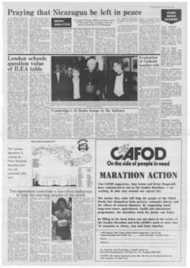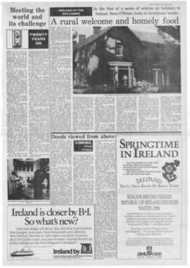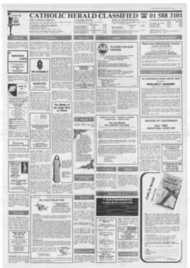Page 1, 28th March 1986
Page 1

Report an error
Noticed an error on this page?If you've noticed an error in this article please click here to report it.
Tags
Share
Related articles
Cautious Welcome To Tax Sweetener
Charities Fear Lawson Warnings
Budget's Double Blow For Charities
By Andrew M Brown
Athohc Charitie - S — Feel
Charities look to Budget income boost
by Jack O'Sullivan DISCUSSIONS over the next few months between the Treasury and charities will determine how Catholic bodies benefit from last week's Budget "bonanza".
Catholic hopes hinge on a scheme allowing tax relief on donations up to £100 a year, when made from individual pay packets.
It is their best opportunity to boost funds. The other concessions on VAT, covenants and company donations seem unlikely to significantly increase income to Catholic charities.
The Catholic Fund for Overseas Development has moved quickly to examine the fundraising possibilities of concessions on payroll giving. Cafod is considering joining. with Oxfam, War on Want, Christian Aid and Save the Children in a management agency, run by the Charities Aid Foundation.
Such an agency would lobby employees to pledge funds to overseas development. It could then act as a clearing house for donations, distributing according to individual preference.
The first meeting of the proposed group will be next month, but nothing will be finalised until after the Chancellor has set out the full details of his plans.
He has said the new scheme, beginning in April 1987, will be operated by employers through charity agencies, which will act as middlemen, distributing donations. But no list of approved agencies has yet been made.
But pressure to launch the charity agencies is strong. The CAF hopes to be able to offer payroll giving schemes to employees by the summer. Such schemes already exist, benefiting charities such as the Save the Children Fund.
So far groups such as the Catholic Housing Aid Society are not committing themselves as to how they might take advantage of the payroll deduction scheme.
Director Bob Khan told the Catholic Herald this week that it was "possible" CHAS might join an agency of housing charities or other Church bodies.
The full potential of the concession for charities has been outlined by Michael Brophy, director of the Charities Aid Foundation. He estimates that if ten per cent of the workforce joined payroll giving schemes at 5p per day, that, with tax relief, would be worth £143 million.
He also said that since the Church is a very major employer, it could benefit from encouraging its employees to donate money to it, for which they would gain tax relief.
Cafod this week also welcomed the decision to relieve charities from VAT on nonclassified advertising and sundry other items. It hopes to benefit from abolition of the upper limit on relief at the higher rates of income tax on charitable covenants.
But neither Catholic organisations nor the Church itself is expected to gain from tax relief on company donations. Most Catholic charities are funded by individual donations.
Westminster Financial Secretary, David Ambrose, pointed out that the exclusion of "closed" (often family) companies from the concessions reduced the chances of covenant organisers being able to put pressure on potential industrial donors.
He also said that reduction of the basic rate of tax by a penny to 29 pence in the pound would cut tax rebates on covenants in the diocese by £56,000 a year. But he hoped to recoup the loss by increased convenanting.
The budget could also provide a boost for Catholic schools, which have charitable status. Although school fees will not be tax deductable, the budget will encourage more donations.
blog comments powered by Disqus











